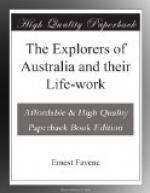Burke and King did not advance far. On the second day Burke had to give in from sheer weakness; the next morning when his companion looked at him he saw by the breaking light that his leader was dead.
The last entries in Burke’s pocket-book run thus:—
“I hope we shall be done justice to. We have fulfilled our task but have been aban——. We have not been followed up as we expected, and the depot party abandoned their post...King has behaved nobly. He has stayed with me to the last, and placed the pistol in my hand, leaving me lying on the surface as I wished.”
Left to himself, King wandered about in search of the natives, and, not finding them, the lonely man returned to the spot where they had left Wills, and found that his troubles too were over. He covered up the corpse with a little sand, and then left once more in search of the natives. This time he found them, and, moved by his solitary condition, they helped him to live until rescued by Howitt’s party on September 15th.
[Illustration. Edwin J. Welch, second in command of the Howitt Relief Expedition, and the first man to find King.]
Meanwhile the absence of any news from Wright, in charge of the main body, was beginning to create a feeling of uneasiness in Melbourne. A light party had already been equipped under A.W. Howitt to follow up Burke’s tracks, when suddenly despatches from the Darling arrived from Wright, telling of the non-arrival of the four men. Howitt’s party was doubled, and he was immediately sent off to Cooper’s Creek to commence a search for the missing men. He had not far to go. On the 13th of September he arrived at the fateful depot camp on Cooper’s Creek, with Brahe. He immediately commenced to follow, or try to follow, Burke’s outward track, but on Sunday the 15th, while still on Cooper’s Creek, King was found by E.J. Welch, the second in command of the relief party. Welch’s account of the finding of King is as follows:—
“After travelling about three miles, my attention was attracted by a number of niggers on the opposite bank of the creek, who shouted loudly as soon as they saw me, and vigorously waved and pointed down the creek. A feeling of something about to happen excited me somewhat, but I little expected what the sequel was to be. Moving cautiously on through the undergrowth which lined the banks of the creek, the blacks kept pace on the opposite side, their cries increasing in volume and intensity; when suddenly rounding a bend I was startled to see a large body of them gathered on a sandy neck in the bed of the creek, between two large waterholes. Immediately they saw me, they too commenced to howl and wave their weapons in the air. I at once pulled up, and considered the propriety of waiting the arrival of the party, for I felt far from satisfied with regard to their intentions. But here, for the first time, my favourite horse — a black cob known in the camp as Piggy, a Murray Downs




